“People say travel broadens the mind. Mainly because people like me insist on it. But I have to say I doubt that it is true. On the contrary, I suspect travel narrows the mind. One becomes so blasé about the wonders of the world. The more I travel the more clearly I understand that all that ever matters is the people. Not the places. This… it’s pretty enough, but show me the humans every time.”
– Travel writer Dame Celia Westholme in Agatha Christie’s Appointment with Death
When I was young I bought wholeheartedly into the idea that travel broadens the mind. My parents believed it and lived it, people around me supported it, and at 18, I had mapped out a plan that would have me living for at least eight months in six different countries before I was 25.
Starting in my early twenties I became skeptical of the notion, in particular of the idea that a person traveling the world made them a better member of society and therefore somehow benefited society at large. I’d heard too many tales of week-long benders at the Pink Palace on Corfu Island in Greece and sex shows in Amsterdam and Laos and all-inclusive resorts in Jamaica where you were advised not to leave the compound lest you be assaulted or killed by a “local”. These stories were all told by travelers. I didn’t see how their traveling was broadening anything for them as individuals, or making the world a better place in any way.
Around 2000 I read a feature story in the Martlet, the student newspaper at UVic, which basically tore apart the notion that traveling somehow makes you a better person. The columnist argued that traveling benefitted the traveler herself and rarely society-at-large. I thought this was a breath of fresh air. Let’s agree, I thought, that travel can be fun…and not usually anything more than that.
In my twenties, I learned the most about life through reading, and, to a lesser degree, mothering. In my thirties new sources of learning emerged for me: Tae Kwon Do, sermons at church and going to work. (I don’t remember learning anything at university, despite being there for eleven years.) But still, I always learn the most through reading. Mostly novels. Jane Austen and Gabriel Garcia Marquez; Ursula LeGuin and Dostoyevsky; Alice Munro and Alexander McCall Smith; Nancy Mitford and J.R.R. Tolkien; Helen Fielding; Thich Nhat Hanh, Julia Cameron, The Gospel According to Matthew. These writings taught me what human nature is, what happens inside people, and how to deal with all that.
My favourite blogger, and a great reader, Penelope Trunk, doesn’t think that traveling is a good or efficient way to learn and grow. This post, from 2009, resonated with me. The final paragraph, in particular, speaks to why I was so reluctant to do this wanderjahr thing in the first place:
“My guess is that the things you are aiming to accomplish while you travel are generally things you could accomplish on a deeper level if you stayed home and made changes to your life instead of running away. Routine and practice are the keys to giving deeper meaning to your life. Sure, disrupting routine is important for gaining new perspective. But you certainly don’t need to travel to the next country. There is plenty that is new right where you are now. Just look closely.”
This past May, she blogged about one use case for travel that she does approve of. (Incidentally, I saw an exhibit about the research she mentions in this post at the Van Gogh museum this summer. There’s something rather ironic about that, since I was “traveling” at the time.)
So yeah, my current situation is a bit odd given that I’ve held these views for the last fifteen years or so.
I’ve been thinking about these things as I process all the new experiences I’ve had in the last three months. Actually, we’ve been away from home for 4.5 months now, but those first six weeks in Amsterdam we didn’t really travel much. We were just adjusting to our new surroundings, and getting used to the idea of being away from home for a whole year. We hardly left the city at all.
But in mid-August we started traveling, and since then we’ve been either on the road or hosting visitors (or both) nearly every week. Now we have a lull, which will last at least two or three weeks and maybe longer. We head to Spain around December 27th, but until then we have no trips planned. We will be laying low in İzmir, which, unlike Amsterdam, is a great place to lay low. Amsterdam is a terrible place to lay low because there is something absolutely irresistible to do nearly every single day, especially in the summertime. İzmir is less of a destination town, more of an everyday living sort of town, so it’s easier to take some “time off” here.
As for reading, I’ve been doing very little meaningful reading so far on our trip. I’ve mostly been using reading as an escape, or a way to unwind, and so I’ve been reading my “Valium authors” (writers whose work is so effective at calming me down that I use it like a drug during times of stress, duress and loneliness): E. F. Benson, P.G. Wodehouse and Nancy Mitford are the main ones.
(A notable exception was that I read The Heart Is a Lonely Hunter by Carson McCullers in July and August. That was a great novel for learning, and had many “put down the book and just think about that for a minute” moments for me. It was especially interesting in light of other things that were happening at the same time: I was reading Huckleberry Finn to Sebastian, the Amsterdam library had an exhibit of books and prints about the history of slavery, the Amsterdam Museum had an exhibit about the Dutch Golden Age, with particular attention to the role of slaves in the building of the empire, we were watching Downton Abbey. Lots of interesting themes running through all of these things. Maybe that’s another post. I’ve also been reading Midnight’s Children for the last couple of months. I love it, but I’m getting through it very slowly, mostly because I’ve been turning to my Valium authors for comfort.)
Last week we were in İstanbul and it amazed me more than anything else on our trip so far, which is not to say that it is my favourite thing that we’ve seen or done, just that it was the most surprising, and opened the most new doors in my mind. People sometimes talk about how stargazing can make them feel insignificant, just a small speck in a huge universe, and this feeling can be bad or good depending on what you bring to the moment. I had a feeling similar to this when we took our mandatory tourist Bosphorus boat tour. The city.
 It’s just so beautiful and there’s so much of it.
It’s just so beautiful and there’s so much of it.  It goes on and on and on and it feels like it would take 20 years to explore.
It goes on and on and on and it feels like it would take 20 years to explore.
It aroused unfamiliar feelings in me. The feeling of being insignificant, but wanting to be significant. I think it’s called ambition.
I was like “What, this whole awesome thing has been here for hundreds of years and I’ve never seen it before? And I never even knew about it?” And “I have to do something that matters in this life. Look at this city. How can I somehow live up to this?” And “I want that house. And that one. And that palace too.”
“Who lives here?” Sebastian asked, marveling at some of the private houses up on the hills.
“CEOs of banks,” I said.
“And what do they do?” He was feeling ambitious too.
It made me want to learn more. By reading. It made me want to read about İstanbul.
The next day we went to Topkapı Palace and the kids were full of questions, in particular about harem life. And I got excited looking at everything. I was excited because I was thinking about all the reading I was going to do to learn about the history of the harem and the Ottoman Empire, and the spoonmaker’s diamond. So even when I’m in the throes of doing and seeing, I still daydream about the reading I’m going to do later about the thing I’m doing and seeing at the moment.
I bought a book in the gift shop: Orhan Pamuk’s İstanbul: Memories and the City. I’m just over halfway through and many things have struck a chord, and I have to admit that reading it immediately after being there, and seeing with my own eyes all the things he describes is so much more meaningful than if I had just read it on my couch at home in Canada, and taken his word for it about all the wonders of the city.
The thing he talks about most in the book, however, is something I can’t relate to after our four-day touristic visit, which is the deep melancholy of İstanbul. I believe him, but I wouldn’t have known that the city had that aura based on my own experiences. He says you have to live there for ten years before you can really feel it. I believe that too.
A couple of coincidences that seem magical:
1. On the last morning of our stay in İstanbul, we were breakfasting on the roof terrace of our hotel when all of a sudden all the boats in the Bosphorus started sounding their horns. This went on for what seemed like five minutes, but was probably just one. What was it about? We had no idea. Until I read this, lying in my bed back in İzmir a few nights later:
“…all the ships in the sea sounding their horns at the same time as the city comes to a halt to salute the memory of Atatürk at 9.05 on the morning of 10 November”
And we were actually there and we actually heard it! But we didn’t know what it was. It was a little mystery that presented itself to us without us even realizing that it was there. (Rick Steves has an explanation of this phenomenon in the final paragraph on this page)
2. Yesterday the children and I went to go see the film Thor at the Konak Pier mall. But they wouldn’t let us in because Sebastian is too small. We discovered when we were in the Netherlands that parental discretion is not a thing in Europe. The state decides which films your kids can see (in the theatre), not you. Apparently it’s the same in Turkey. Sigh.
ANYWAY, we didn’t get to see the movie but we did get to browse at the very cool bookstore in the mall for about an hour and then, as we were leaving, I noticed there was a gallery exhibiting a bunch of black and white photos. They looked familiar. They were of İstanbul. In fact, they were Ara Güler’s photos of İstanbul, many of which appear in Istanbul: Memories and the City. I dragged the kids into the gallery and walked around in ecstasy, relishing the opportunity to see the photos in large format and resisting the urge to order prints of every one. You can learn things without possessing them.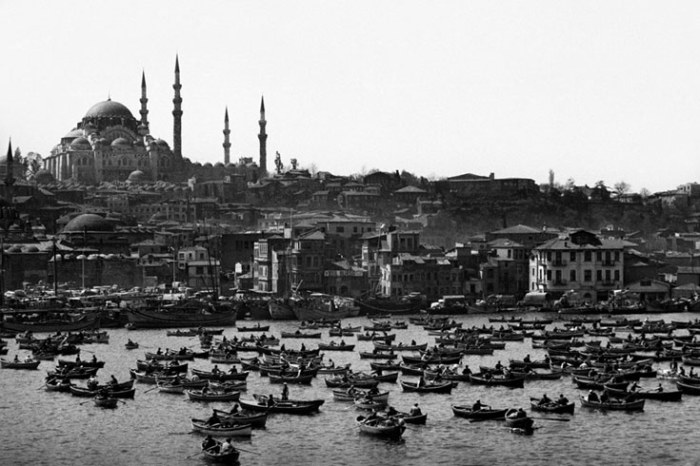
And those two things go against my notion that there’s no value in travel, in terms of learning and growth. Hearing the ships’ horns on the Bosphorus saluting Atatürk and seeing Ara Güler’s photographs couldn’t happen while lying on my couch back home. But then again, it was the reading that lent the two events significance.
As for the value of travel for children, well, I’ve been skeptical of that as well, but I’m starting to come round a little.
Sebastian had an experience while we were waiting in line for the cable car to take us up to Pierre Loti. He was sitting on a bench and two women were sitting on either side of him, making a fuss over him. This is absolutely the norm in Turkey. I can’t tell you how may people make a fuss over him and give him random gifts. It happens nearly every day. What was slightly different this time was that one of the women was covered. Everything except her eyes and nose. This particular method of covering was new to me in İstanbul. Very few women cover in İzmir and very, very, very few cover more than just their hair. In İstanbul, we saw many women showing just the eyes, and some that did this unusual eyes and nose technique. It looked very strange.
The woman was quite young, maybe 19, and very sweet. She and Sebastian became best friends, and she even took a photo of him, but demurred when I asked if I could take a photo of them together. They chatted for while, and then Sebastian joined us in the line up. He was delighted to have made yet another friend. A couple minutes later he tugged on my sleeve and asked, “Why are her and her friends wearing those pretty robes?”
It was the innocence of the question that made me realize that there was something there, something that was going to be totally different in his life than it was in mine. I never saw a covered woman until I was in my twenties. As a result, I have prejudices not easily overcome at this late stage in my life. When I think back to my reaction on seeing a covered woman back home in Canada, I realize I really think of her as “other” and not like me. I think of her as someone who probably wouldn’t want to have anything to do with me, and I am by default less gregarious than I would be if she were just a woman that I don’t know but who isn’t covered. It’s not suspicion or fear, necessarily, but it is an assumption that she is very different from me, and that we are separate. I think I will feel that less now, after spending three months in a Muslim country, but the neat thing is, Sebastian will never feel it at all. Because at seven, he makes friends first and notices differences later. It’s very like the first day we arrived in Tanzania, where he was sitting in his cousin’s lap and just asked, by the by, “Keyfa, have you noticed that almost everyone in Africa is black?”
So I guess I’m letting go, a little bit, of my mantra “If the good Lord meant for us to travel, then why did he create home?” I still love home, and miss it all the time, but I am learning out here in the world. And hopefully the kids are too, a little. In the kids’ case, I’m even starting to believe that their learning will benefit society at large. In the near future, we will need Western kids to be unafraid of Islam, and that nonfear is not easy to cultivate at home.
As for reading, I’ve still got half of the Pamuk to go, then I’ll finish Midnight’s Children and then I’m going to tackle Pamuk’s novel, My Name is Red, that actually takes place in a sultan’s palace, which seems like it will be exciting. Did I mention that he is a Nobel laureate? I would love to finish it before we leave Turkey in 40 days.

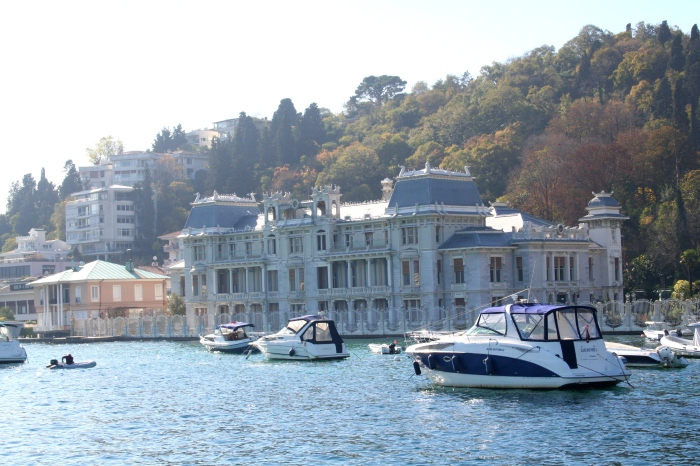


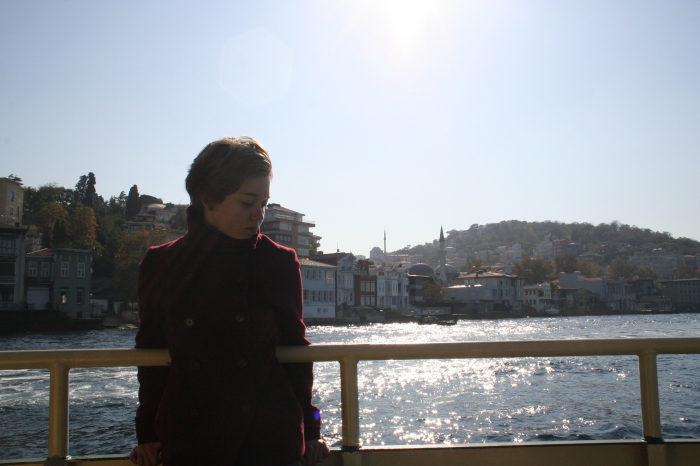
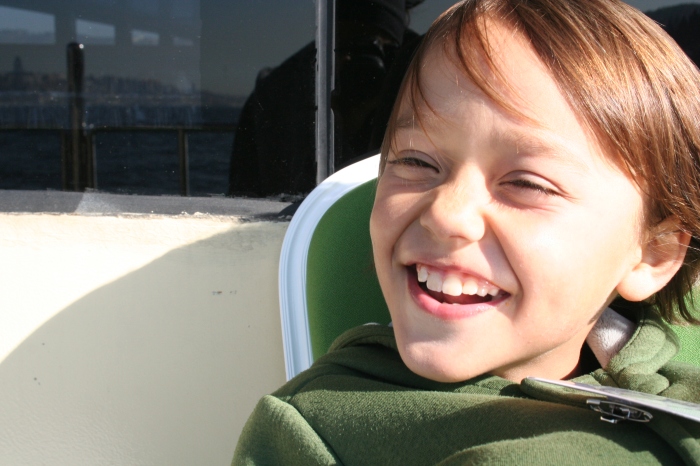
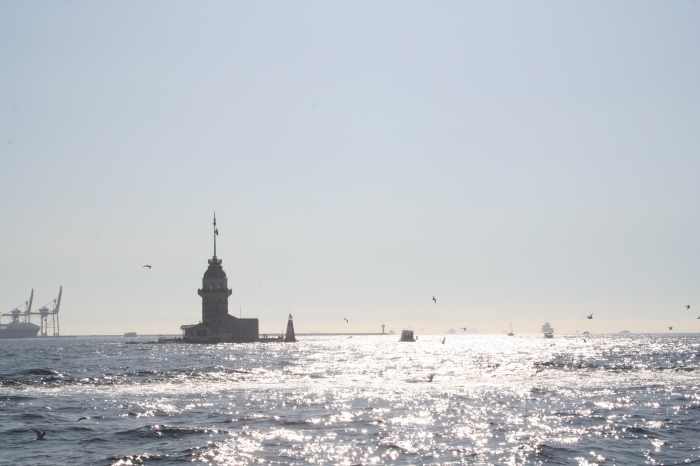
Hi–I’ve been reading through your amazing trip since you commented on my post about Lego Friends. As a person who’s also not very good at leaving home, I am both envious and also totally impressed. I don’t know if you saw my reply comment, but I realized I definitely read your journal like ten years ago! I had a journal called Blueberry Hill (loooong gone) and I was working in Silicon Valley at the time. I hope this is not super-weird.
Pingback: Slow Tourism: More Notes on Traveling | Our Wanderjahr